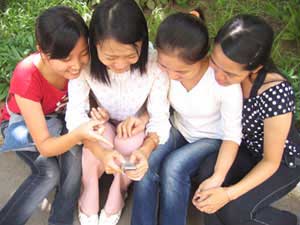The Digital Age Leads Many Young People to a “Digital Lifestyle,” “Digital Habits,” and Even “Digital Consequences”!
The author of this piece, also a technology enthusiast, does not aim to make grand statements but simply wishes to reflect on what he sees, hears, and feels, hoping that others—especially young people—will contemplate these observations…
“Digital Habits”
 |
Illustrative image |
Story One: During lunch break, Hương (an office worker) rushes over to Quỳnh: “Come here, I need to talk.” “Oh my! Why not just buzz me instead of running over? If anything comes up, just message me or email me; it’s easier, we’re used to it now.”
Yes, who doesn’t know they’re used to it? Used to chatting, used to being online, so often no one sees two close friends huddled together, giggling like they used to. “It’s not like we’re far apart or anything; we went to the same university, are as close as sisters, and now work at the same company, just two rows apart. Yet, we communicate through short messages and those unchanged “smiley faces” (Yahoo Messenger emoticons) all the time. Why?” Hương feels a bit sad.
Story Two: In another workplace, a woman recently gave birth to her first child, but her husband often comes home late after drinking, leading to constant arguments. She recounts that every time this happens, they sleep separately: he on the couch, she in the bedroom, and they end up texting each other… arguing.
“When we talk, it can lead to impulsive words and insults due to frustration. But when texting, everyone has to think carefully and choose their words to fit within 160 characters, which makes it somewhat calmer. Yet gradually, after many such incidents, the situation worsens, and the couple talks less and less, as if there’s a deep chasm between them. Can you believe it… a wife on the first floor and a husband on the second floor texting each other to remind each other to pick up the child from grandma’s house….” She laughs with a hint of sadness…
Story Three: Việt Hưng (an office worker, 24 years old – Alley 120 Chùa Láng – Hanoi) is a young man who voluntarily lives by “digital principles.” His daily activities are “tightly connected with technology,” operating “like a digital machine.”
Can you believe Hưng sets his phone alarm with just a tiny, short MIDI ringtone? (If it were me, I’d probably need a cannon sound). That’s a good habit he has practiced for a long time; just one small ring at the right time lets him know what he needs to do.
Hưng uses quite a modern mobile phone, and every plan for the day, even weekly plans, are saved in his device, ringing to remind him of tasks down to the exact minute! We’ve gotten used to the scene of him sitting with friends when suddenly a loud metallic ring cuts through: “I have something important, so I set the volume high; goodbye everyone”… Naturally, everyone feels a bit let down.
Story Four: Many young people today live in a way that they “eat mobile, sleep mobile,” staying up with online games, the Internet… Their daily language has also changed, often revolving around terms like “chat, voice, email, digital music, strange ringtones, online, offline…” which have become commonplace phrases…
If you pay attention, you will notice an increasing number of words “not found in the dictionary,” emerging from chat language, SMS language, and communication in online games… infiltrating the communication culture of young people: They don’t say “too sad” but “Bun wa,” not “I know” but “bit rui.” They say goodbye with “pai pai,” “Cu 29” (see you tonight), “G9” (good night)…
Then there are all sorts of incomprehensible expressions like “he he,” “ke ke,” “ka ka,” “oài,” “oạch,” “hic hic,” “ac ac” (gasping)… used indiscriminately in life… Someone has complained: “I don’t know how to respond; it’s always kakaka, showing too much joy is also kakaka, feeling bored is also kakaka… Then to express feelings, people gradually become accustomed to using hihi, haha, hehe… more than normal facial expressions—does that seem “normal”?”
“Slaves” to Machines and the “Digital Consequences”…
 |
| In a “one square meter room” at an Internet café, one can rest their head on the table and sleep until the next morning. (Photo: Thu Thảo) |
These stories seem to occur daily, but we rarely pay attention or perhaps don’t care much. Yet they are part of the culture of contemporary youth. There are positive aspects, but also a distancing from traditional values and culture. Mastering technology and becoming “digital slaves” seems to be a thin line? Or is it the inevitable price for the younger generation integrating into the modern age?
“Sometimes I feel incredibly dependent. Once my phone broke and I couldn’t get it fixed in time; everything just fell apart, and I suddenly realized that I had long lost the habit of remembering the things I needed to do in my head,” “Going out without phone credit? Definitely lacking confidence! A day without going online for a few hours? Feels incredibly unproductive…” Việt Hưng has complained like this more than once!
There are several young people, I guess they are students, perhaps even high schoolers—who visit the café with Wi-Fi near my workplace every day, with high-end phones and fancy laptops, always chatting and laughing. But upon closer inspection, they only sit there “copying” ringtone files back and forth, sharing colorful wallpapers and… chatting.
When I asked them about it, one guy in the group laughed, “It’s the IT era; it has to be this way to be trendy and to be able to access technology, right?” Hearing that made me happy, secretly blaming myself for thinking conservatively; it’s great that their parents can provide them with digital tools to access the latest advancements! Sadly, my joy didn’t last long when I witnessed one guy arguing about the change with the café staff, counting repeatedly and then pulling out his phone to do the math. A polite foreigner asked them a few questions in English; the whole group looked baffled and burst out laughing mockingly…
The habits and costs of cultural encroachment on traditional values for young people are still minor issues. The stories about the unfortunate “digital consequences” that some young people face are much more troubling.
Traps in the Virtual World
A young man who wished to remain anonymous recently made headlines with a written account of how he became a victim of high-tech crime. The piece is a five-page letter from prison, filled with heartfelt reflections from a young man who admits to being caught up in the dark seductions of high technology.
 |
| Diving deep into the virtual world, what about the future? Who cares! (Photo: Thu Thảo) |
At just 19 years old, a student from Ho Chi Minh City University of Technology is passionate about IT and has a knack for exploring issues related to hacking and online intrusion. After accidentally acquiring a “free” account from a foreigner, he decided to try buying things online using that account. Everything went smoothly, and realizing how easy it was to make money, this young individual began to make serious mistakes by experimenting recklessly, ultimately creating fake ATM cards to withdraw billions of dong in illegal funds for personal use.
He admitted that the power of mastering technology, “the power to control information is a temptation,” can easily lead people to make mistakes. Ultimately, he was led astray by that temptation, resulting in negative consequences that no one wishes to face, yet the risks are very real. “I hope my story will awaken you all; take my experience as a lesson, as I am paying a very high price” (excerpt from the article).
Mr. D.T., the director of a private enterprise in Hanoi, once shared a shocking story with me. A girl who hadn’t even graduated from high school, living in a household where her parents constantly argued and belittled her, ran away from home for months, “drifting” to live in the virtual world. She was online all day under the self-created guise of “a student studying abroad in the UK,” appearing obedient and charming, and was respected and loved by her online community (including a close-knit group of friends she met through chat) as if she were a little princess.
To sustain her life in that virtual world, the girl would sit in internet cafes all day long without a dime to her name, chatting with her group. By the end of the day, she would enter other chat rooms crying for help, saying she was “stuck without internet,” and was willing to follow strangers as long as they paid for her internet, provided her a place to eat and sleep, and gave her a little cash for the next day to… continue chatting.
Many assert that this is not an isolated case; in reality, there is a whole generation of young people like this, escaping reality to live in a virtual world where they feel valued or mentally better off, despite the unpredictable consequences. Are they becoming “digital slaves” among the youth?!
Thế Phong




















































